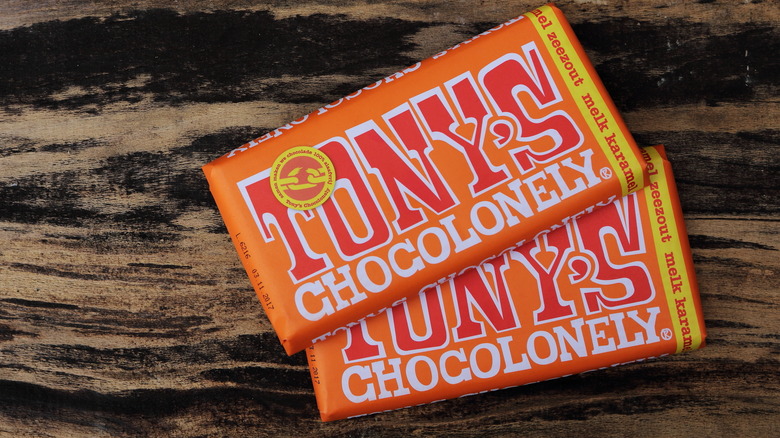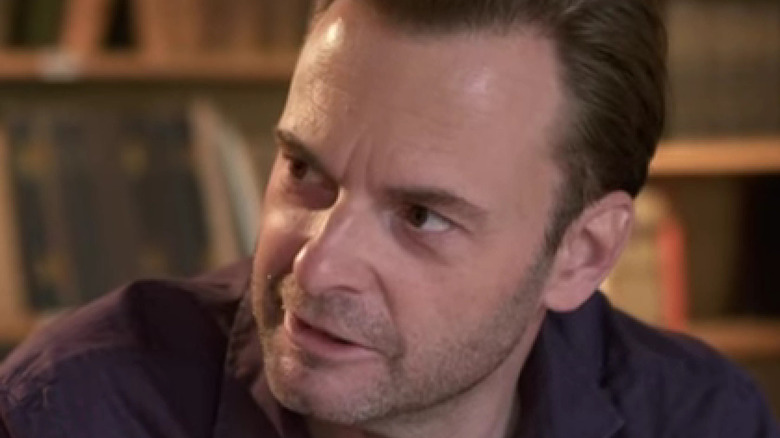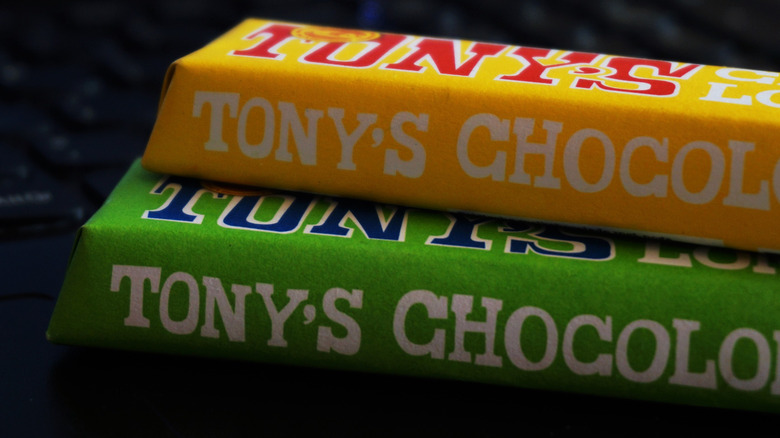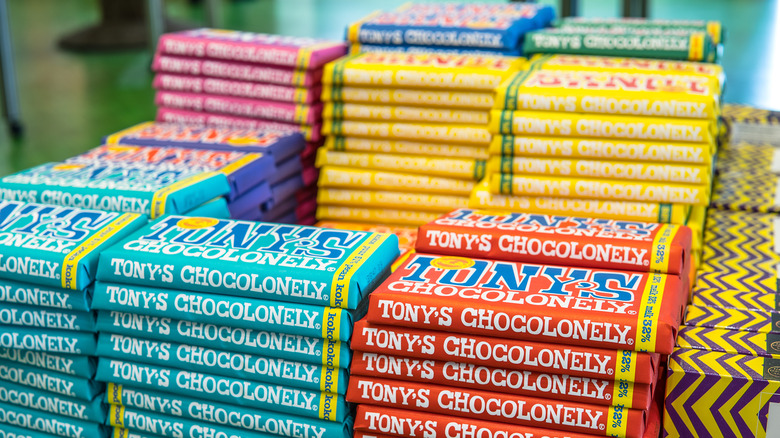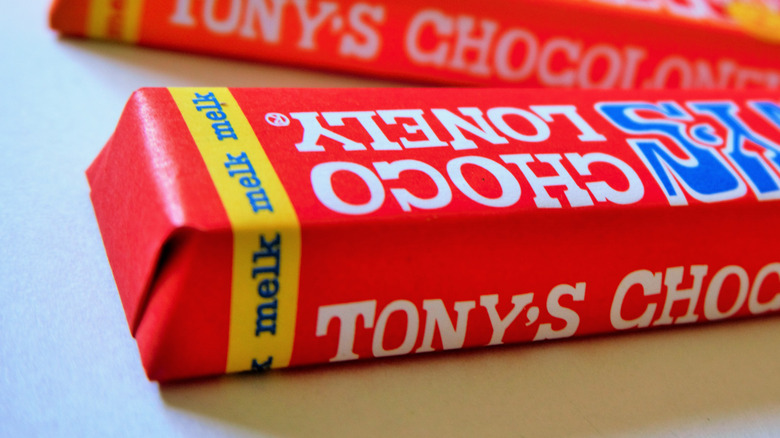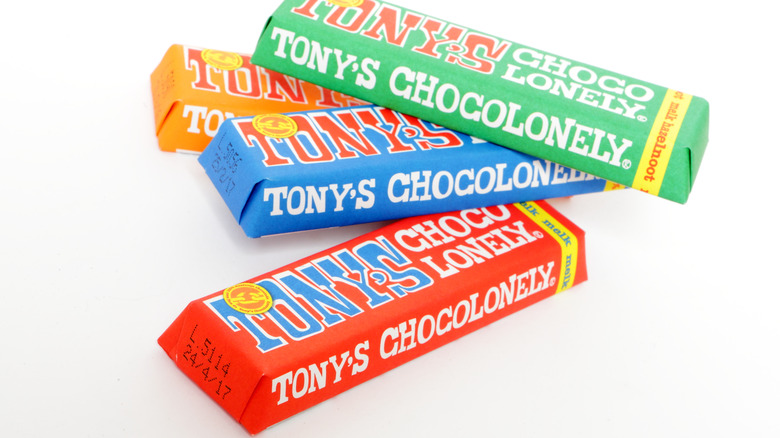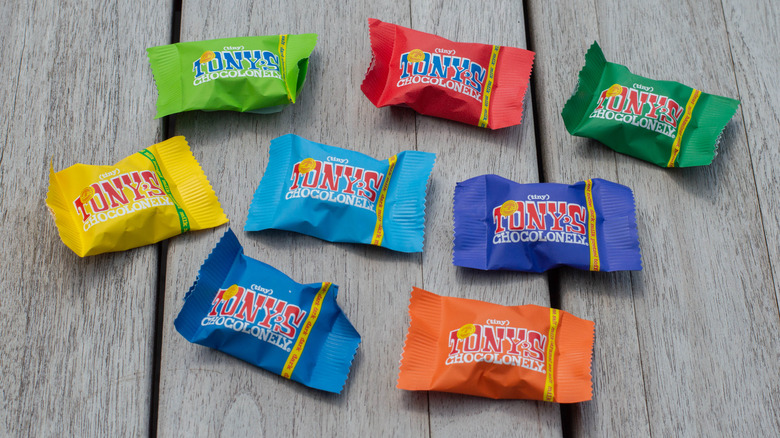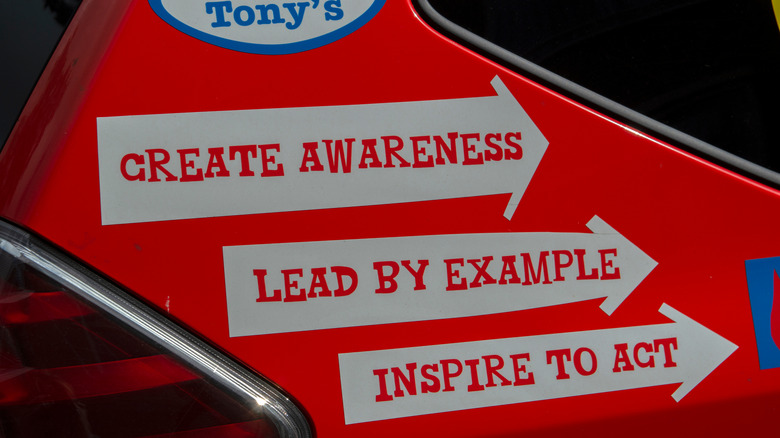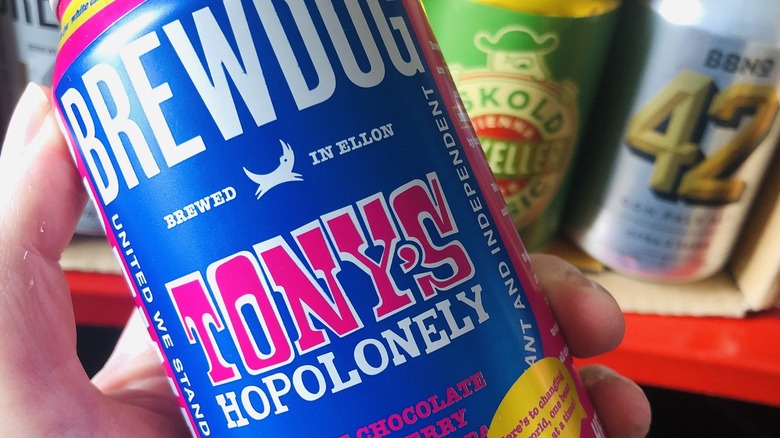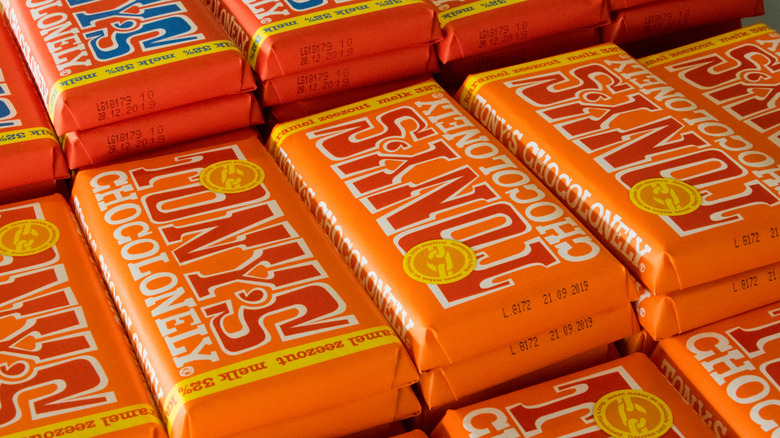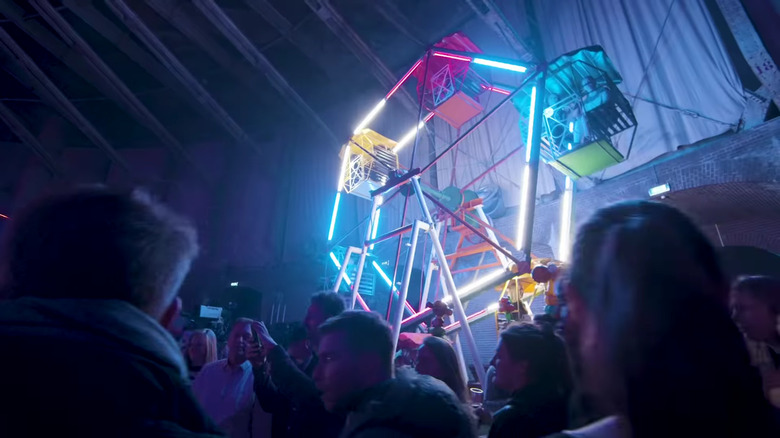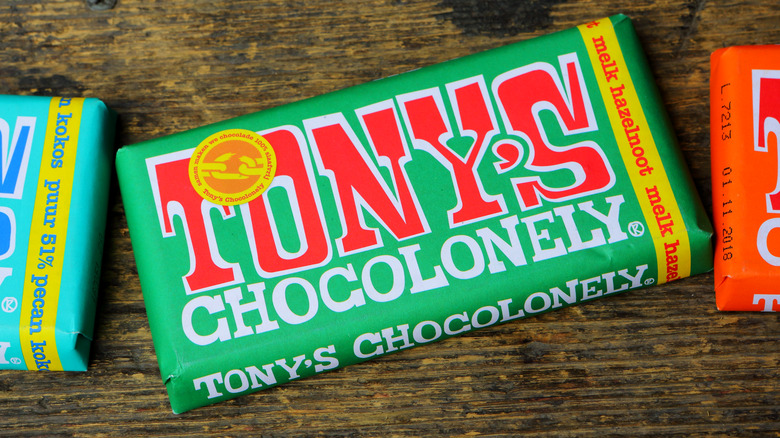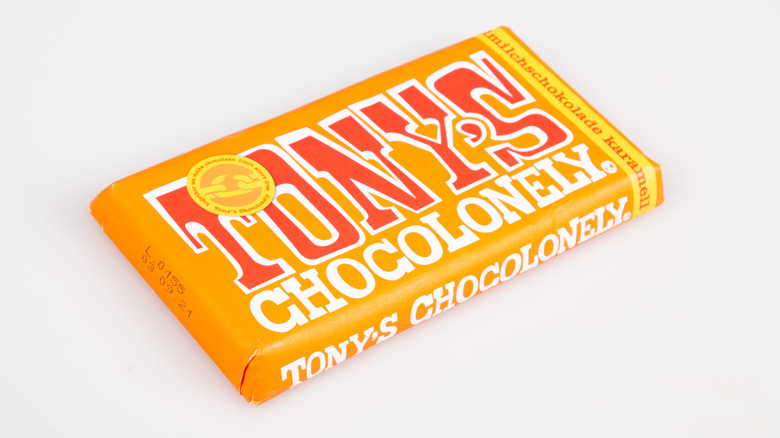The Untold Truth Of Tony's Chocolonely
Chocolate is one of the world's favorite treats; whether it's a beverage, put into a cake, or in the form of a bar, we just can't get enough of it. According to a 2021 Statista report, the American chocolate market is valued at approximately $9.67 billion, demonstrating that although we might not chalk the product down to divine intervention as the Aztecs did, we still worship it.
However, modern, globalized chocolate production harbors a very dark secret. Child labor and slavery are widespread practices that occur within cocoa plantations and chocolate supply chains. As reported by the State Historical Society of Iowa, children are often abducted, forced to work for meagre or no pay, and often do not attend any form of schooling.
Tony's Chocolonely, a Danish chocolate manufacturer, has attempted to tackle this industry issue head on. The spotlight that Tony's has shone on the chocolate industry has given manufacturers, including itself, no place to hide. Read on to discover the untold truth of Tony's Chocolonely.
Tony's Chocolonely was inspired by a TV show
In May 2003, "Keuringsdienst van Waarde," a Dutch TV program that provides an investigative examination of consumer products, aired the first of two episodes that focused on the use of slaves and child labor on cocoa plantations in Western Africa. One of the show's presenters, a man called Teun van de Keuken, was shocked by both what he saw and the apparent disregard of the issue by major players in the chocolate industry. To make matters worse, those who bought cocoa from these plantations were clearly ignoring the Harkin-Engel Protocol, a voluntary agreement many of them had signed which pledged to eliminate the worst forms of child labor, per Slave Free Chocolate.
In an effort to raise awareness of the chocolate industry's illegal actions, van de Keuken staged a publicity stunt where he ate a number of chocolate bars made by manufacturers that utilized slave labor. He then proceeded to instigate a lawsuit against himself for knowingly buying an illegally manufactured product, per the Irish Times. Whilst the lawsuit ultimately proved unsuccessful, van de Keuken was inspired to take matters into his own hands. He launched Tony's Chocolonely in November 2005, a brand that aims not to use slave labor and is Fairtrade.
Tony's Chocolonely has spoken out about slave labor
In 2006, Tony's Chocolonely was taken to court by Belissimo, a Swiss chocolate manufacturer, to dispute the chocolate brand's promise that they do not use any slave labor. According to Dutch News, despite the court ruling that Tony's Chocolonely could continue to label itself as 100% slave-free chocolate, the company changed their slogan to "on the way to 100% slave free chocolate." Achieving this goal, not only for their own products but for the industry as a whole, has led the company to make changes to its own supply chain on multiple occasions. For example, Tony's Chocolonely ceased using Turkish hazelnut providers after Dutch current affairs program "EénVandaag" highlighted the use child labor during the harvest.
Tony's mission of making ethical chocolate the norm has seen them criticize other producers such as global snack making giant Mondelēz International, per Grocery Gazette. As the parent company of British chocolate manufacturer Cadbury and other eminent chocolate brands, Mondelēz International is one of the largest chocolate suppliers in the world and as such its practices have huge sway over the industry. Unfortunately, as reported by The Guardian, a documentary revealed that plantations used to supply the retail giant widely utilized child labor. In a LinkedIn post, Tony's Chocolonely lambasted the company: "You don't pay enough for your cocoa... You directly drive farmers into poverty and they have no choice but to use children to farm your cocoa."
They have been gradually expanding their operations
From its humble beginnings, Tony's Chocolonely has grown to be the largest chocolate manufacturer in The Netherlands. As noted in Forbes, this sustained growth at home has been matched by impressive overseas expansion. In 2015, Tony's Chocolonely expanded into America, and by 2017, their chocolate was sold in all 50 states.
Peter Zandee, who at the time of expansion was Tony's Chocolonely's U.S. sales manager, explained to Confectionary News that moving into the U.S. was less about commercial gain as it was proving a point to the World's largest chocolate manufacturers. Success for Tony's in this saturated chocolate market provided definitive proof that utilizing tightly controlled cocoa sourcing systems is not only feasible, but also profitable and as such, pressured large chocolate manufacturers to start adapting the same diligent processes.
In Western Europe, the world's largest chocolate market, Tony's Chocolonely has gone from strength to strength. In 2021, previous expansion and subsequently soaring sales in the U.K. pushed the company past the €100 million revenue mark for the very first time, according to Confectionary News. The socially minded chocolate company shows no signs of slowing down either, with the acquisition of Belgium chocolate manufacturer Althaea-De Laet international and the construction of a new factory and visitors center north of Amsterdam indicating a period of exciting growth is yet to come.
There's been evidence of child labor in their supply chain
Per a February 2022 post on the Tony's Chocolonely website, the chocolate industry as a whole has child labor rates of 46.5%. By comparison, on the cooperative farms who have long standing partnerships with Tony's Chocolonely, child labor rates stand at 3.9%. But as The Times reported in 2021, 1,701 child workers were identified in Tony's Chocolonely supply chain. In their annual report, Tony's attributed this large number, which is over four times more than they identified the year before, to new partnerships with two farming cooperatives, Asetenapa and Asunafo, which had a combined child labor rate of 50.5%.
Rather than hide these figures, Tony's has held them up as an example of their sourcing principles working. As they explained in their aforementioned post, "Proactively looking for child labour in your supply chain means you can fix it, and that means change is happening." No instances of modern slavery were found during the production of the report, or ever for that matter. Tony's claims to monitor both illegal working practices closely, although they have stated that they cannot watch farms around the clock.
Tony's Chocolonely pays 'Tony's premium'
As highlighted numerous times in Tony's Chocoloney's annual report, poverty at the earliest point of the cocoa supply chain, i.e. the farmers, is the key driver of child labor in plantations. Without the means to hire professional help due to the low cost of cocoa, farmers are often forced to employ their own children or utilize other illegal labor methods, according to the World Cocoa Foundation.
The cost of cocoa is determined by something called the farmgate price, which is an official, variable price set by the government throughout the season. As reported by Tony's Chocolonely, Côte d'Ivoire's current farmgate price of $1,403 per tonne is well below the living income reference price of $2,200. Fairtrade seeks to negate some of this discrepancy by charging companies a premium to use their label. To be Fairtrade certified cocoa manufacturers must pay an extra $200 per tonne, all of which goes directly to the farmers, per Fairtrade Foundation.
However, this still leaves farmers in Côte d'Ivoire approximately $600 short of attaining the living income reference price. In order to fix this discrepancy and bring their farmers up to a living wage Tony's Chocolonely also pay "Tony's premium." As noted on the company site, this is a fluctuating sum that changes in response to the farmgate price, always ensuring that farmers earn a living wage regardless of market variations.
Tony's Chocolonely is not on the Slave Free Chocolate List
Despite Tony's Chocolonely's mission to make sure their chocolate production line is 100% slave-free, the company found itself removed from the Slave Free Chocolate List in 2021, per Food Navigator. This was not due to cases of slavery in Tony's Chocolonely's supply chain, but rather due to a professional association with Barry Callebaut, a global chocolate producer. Barry Callebaut has been embroiled in multiple child labor cases, including most infamously, a case brought to court by eight former child slaves, as reported by Confectionary News.
Tony's Chocolonely have defended their partnership with Barry Callebaut by claiming that working with such large cocoa processors is necessary to prove the efficacy of their sustainable approach. In short, without showing Tony's Chocolonely's approach can work to scale no other large chocolate manufacturer would be convinced to make changes to their own supply chains. Furthermore, Tony's Chocolonely maintains that none of their products have been tainted by Barry Callebaut's practices as all their beans and products are kept separate due to the demands of their 100% traceable supply chain.
They've addressed the issue of deforestation
As reported by the World Cocoa Foundation, cocoa producing countries in Western Africa experience extremely high rates of deforestation; Côte d'Ivoire has lost 23% of its tree cover since 2000, per Global Forest Watch. This, according to Tony's Chocolonely, is somewhat attributable to impoverished cocoa farmers looking to increase sales by using extremely fertile rainforest soil.
In an effort to monitor the farms they work with, Tony's Chocolonely has used GPS technology to map the farms and thus confirm no farming is taking place in protected areas. In regard to deforestation Tony's Chocolonely still has some work to do. According to the 2022 Chocolate Scorecard, a survey of the world's largest chocolate companies, Tony's deforestation and climate policies could be improved by adding science-backed targets to their annual public reports.
Other efforts, such as the Cocoa & Forests Initiative, encourage the use of alternative farming techniques to combat deforestation. One such method is agroforestry, which is where cocoa yielding trees are planted alongside other trees and plants designed to restore ecosystems, per Cocoa & Forests Initiative. This alternative to monocropping has been proven successful all across the globe, from smallholder farmers in Brazil to shelterbelts in Scotland.
They designed bars to ignite conversation
Tony's Chocolonely kickstarted their 2022 by ditching the bright wrappers they are known for and replacing them with white wrappers imprinted with one of three words: inequality, inhuman, and injustice. Per SHEmazing, Jo Lane, the chief marketing office for Tony's Chocolonely, said of this change, "Our Conversation Bars and accompanying campaign is designed to facilitate constructive conversations between people on all sides. ... By increasing empathy and understanding around these three important issues, on a societal level and in the context of the chocolate industry, we hope to drive more support for our mission to eradicate modern slavery and illegal child labour."
This isn't the first time Tony's have made changes to their chocolate bars in order to reflect the industry as a whole. In 2012, Tony's Chocolonely went from producing uniformly divided chocolate bars, which are the norm of nearly every manufacturer, in favor of unequally divided ones which better reflected the chocolate industry as a whole.
They have collaborated with other industry disruptors
Disruptor brands with a social and environmental conscious approach, such as Tony's Chocolonely, have steadily become more prominent as we progress through the 21st century. As reported by Sustainable Brands, the market for "sustainable" companies is huge, worth approximately €2.5 trillion. As such, it should come as little surprise when brands with similar ethos, and in some instances similar products, seek each other out in the hope of collaborating.
Tony's Chocolonely is one such brand that has never shied away from collaborating with like-minded companies. Their most famous collaboration being with BrewDog, the environmentally minded brewer, per Confectionary News. The resulting product, a white chocolate and raspberry IPA called Tony's Hopolonely, was sold across Europe with sales being used to support the Chocolonely Foundation.
Collaborations are not just limited to the creation of new products. In April 2022, Tony's Chocolonley partnered with The Body Shop, a cruelty free beauty and skincare manufacturer, to educate those in New York City about climate action, per AMNY. Free handouts of chocolate and beauty products were used as an entry point to raise awareness of the FOREST act, a bill that aims to prohibit the import of products linked to illegal deforestation, per Mongabay.
Not all Tony's marketing moves have been received well
Unfortunately for Tony's Chocolonely not all of their inventive marketing ploys have been well received. According to the Daily Mail, some social media users wrote off the aforementioned Conversation Bars as publicity stunts; The Economist called the brand "woke." However, the largest backlash to Tony's marketing ploys undoubtedly occurred as a result of the Dutch firm's 2021 Christmas advent calendar.
As reported by Sky News, Tony's Chocolonely deliberately left the space behind day eight empty. This being an attempt to highlight the inequalities present within the industry. As clarified by the company in a Twitter thread, "In Ghana and the Ivory Coast, at least 1.56 million children work under illegal conditions because the price being paid for cocoa is too low... just like our bars are unequally divided to tell this story, so too is our calendar."
Whilst some received the marketing ploy as intended, many others were upset. As reported by the Daily Mail, parents of neurodivergent kids took to social media to express their disappointment with the chocolate-less calendar squares. Per the BBC, Tony's Chocolonely soon issued an apology: "We failed to consider the difficulties empty windows can cause for neurodivergent children and adults. We have more to learn in considering how we can make our products as inclusive as possible."
Tony's FAIR, a party for stakeholders, is held every year
The term stakeholder meeting does little to inspire excitement. Rather it paints a drab image of suited individuals sitting around a large table gazing at a PowerPoint with eyes that battle to stay open. Fortunately for those lucky enough to be invited, Tony's Chocolonely's version, titled Tony's FAIR, is far removed from this stereotype. Live music and art performances are held in an event that seems more like a festival than a business meeting. Yet, Tony's Chocolonely have not lost sight of what a stakeholder meeting should encompass. In depth videos and annual reports ensure that all interested can update themselves on all aspects of the business.
Key to the success of this company is its transparency, typified in these videos and reports, and without which none of its claims regarding traceability could be verified. As reported by Forbes, transparency is absolutely essential for any modern-day business, with elevated consumer concerns regarding the environmental, social, and personal impact of products. And whilst it is hard to imagine other chocolate juggernauts such as Mars adopting this transparent approach, Tony's evident success with this approach may just prove the spark for sector-wide change.
Tony's supports the Chocolonely Foundation
Not content with solely driving change from within the chocolate industry, Tony's Chocolonely has also created an independent foundation, The Chocolonely Foundation, which aims to support programs that benefit cocoa growing societies. As noted on the foundation's website, whilst the organization is primarily funded by a regular contribution of 1% of Tony's Chocolonely's annual revenue, it remains completely autonomous. This money, and that provided by other sources, enable the foundation to support a variety of projects that have included a reintegration center run by GRADE-FRB in Burkina Faso, and 100 weeks, a program that provides money and financial advice for women in extreme poverty, per 100 Weeks.
The foundation also prioritizes schooling through a number of funds, by directly providing farmers with money, ensuring they can afford to send their children to school. This not only improves the children's lives through education, but also minimizes the possibility of that child being subjected to illegal labor practices.
Tony's Chocolonely prioritize people over profit
It should be apparent by now that profit, whilst important, is not the overriding goal of Tony's Chocolonely. Rather, their mission to make chocolate that is 100% free of slave labor is. The mission-driven nature of Tony's Chocolonely is what so often attracts consumers to its products, and as is becoming steadily more apparent, workers to its offices. Speaking to Confectionary News, impact editor Belinda Borck noted that the drive to change the chocolate industry is something every employee at Tony's is extremely proud of, and what initially binds them together. And yet, a powerful mission statement alone is not enough to create a fulfilling and ultimately happy workplace.
Attuned to this fact, Tony's Chocolonely religiously asks employee opinion on all facets of the company and evolves to meet their wants and needs. As highlighted by Borck, "We are an impact company... And that means we put people over profit. Thats about the bottom line of it. We keep on evolving, we keep on learning." This commitment to helping each other, whilst trying to change the chocolate industry is a powerful combination. One which has seen Tony's being labeled a world-class workplace.
